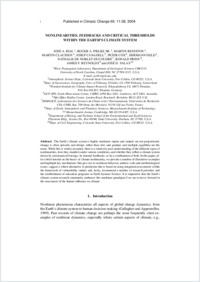Nonlinearities, feedbacks and critical thresholds within the earth's climate system
- Rial, José A. Wave Propagation Laboratory, Department of Geological Sciences, University of North Carolina, Chapel Hill, NC, USA
- Pielke, Roger A. Atmospheric Science Dept., Colorado State University, Fort Collins, CO, USA
- Beniston, Martin Dept. of Geosciences, Geography, Univ. of Fribourg, Switzerland
- Claussen, Martin Potsdam Institute for Climate Impact Research, Potsdam, Germany
- Canadell, Josep GCP-IPO, Earth Observation Centre, CSIRO, Canberra, Australia
- Cox, Peter Met Office Hadley Centre, London Road, Bracknell, Berkshire, UK
- Held, Hermann Potsdam Institute for Climate Impact Research, Potsdam, Germany
- Noblet-Ducoudré, Nathalie de DSM/LSCE, Laboratoire des Sciences du Climat et de l'Environnement, Unité mixte de Recherche CEA-CNRS, Gif-sur-Yvette, France
- Prinn, Ronald Dept. of Earth, Atmospheric and Planetary Sciences, Massachusetts Institute of Technology, Cambridge, MA, USA
- Reynolds, James F. Department of Biology and Nicholas School of the Environmental and Earth Sciences, Duke University, Durham, NC, USA
- Salas, José D. Dept. of Civil Engineering, Colorado State University, Fort Collins, CO, USA
-
2004
Published in:
- Climatic Change. - 2004, vol. 65, p. 11
English
The Earth's climate system is highly nonlinear: inputs and outputs are not proportional, change is often episodic and abrupt, rather than slow and gradual, and multiple equilibria are the norm. While this is widely accepted, there is a relatively poor understanding of the different types of nonlinearities, how they manifest under various conditions, and whether they reflect a climate system driven by astronomical forcings, by internal feedbacks, or by a combination of both. In this paper, after a brief tutorial on the basics of climate nonlinearity, we provide a number of illustrative examples and highlight key mechanisms that give rise to nonlinear behavior, address scale and methodological issues, suggest a robust alternative to prediction that is based on using integrated assessments within the framework of vulnerability studies and, lastly, recommend a number of research priorities and the establishment of education programs in Earth Systems Science. It is imperative that the Earth's climate system research community embraces this nonlinear paradigm if we are to move forward in the assessment of the human influence on climate.
- Faculty
- Faculté des sciences et de médecine
- Department
- Département de Géosciences
- Language
-
- English
- Classification
- Geography
- License
-
License undefined
- Identifiers
-
- RERO DOC 4899
- DOI 10.1023/B:CLIM.0000037493.89489.3f
- Persistent URL
- https://folia.unifr.ch/unifr/documents/299663
Statistics
Document views: 231
File downloads:
- Texte intégral: 428
